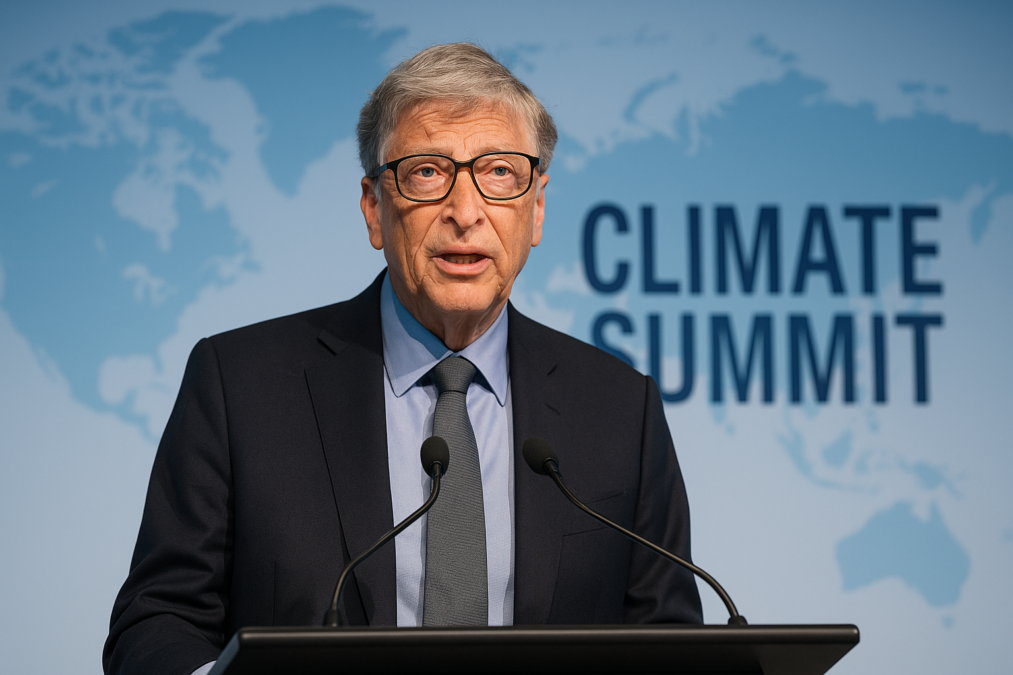Bill Gates Says Climate Change Won’t End Humanity, Urges Focus on Disease and Poverty
In a surprising shift, Bill Gates has made an argument. He is one of the world’s most vocal advocates for cutting carbon emissions. This challenges years of mainstream climate activism. He believes that the global fight against climate change should no longer be the top funding priority for philanthropists.
In a new essay published Tuesday, Gates urged the world’s wealthiest donors to redirect more resources. He wants them to focus on tackling disease and hunger. He wants them to focus on tackling disease and hunger. He called those crises far more immediate and deadly than global warming.
“Climate Change Will Not Erase Humanity”
Gates emphasised that while the climate crisis poses serious risks, it does not threaten human survival. He noted that global investments in renewable energy, technology, and emission reduction have already produced tangible progress. However, he suggested that some of the money has been misallocated to “expensive and questionable” projects.
“Climate change, disease, and poverty are all major problems. We should deal with them in proportion to the suffering they cause,” Gates wrote.
The Microsoft co-founder argued that with President Donald Trump’s elimination of USAID, the U.S. Agency for International Development, billions of dollars in humanitarian support have vanished. This has worsened the global fight against famine and preventable diseases. Gates said this reality demands a “refocus on saving lives now,” particularly in the world’s poorest regions.
Unbalancing Philanthropy
While insisting that investment in decarbonization should continue, Gates wrote that the world must prioritize human welfare over emission metrics:
“Climate change will have serious consequences. It will particularly affect people in the poorest countries. However, it will not lead to humanity’s demise,” he stated. “This is a chance to refocus. The metric should count even more than emissions and temperature change. That metric is improving lives.”
The essay comes just weeks before COP30. This is the upcoming United Nations climate summit. World leaders will gather there to discuss new pledges for carbon neutrality.
From Green Energy to Global Health
Gates spoke with CNBC’s Andrew Ross Sorkin on Tuesday. He described his new position as a huge disappointment. However, he said it was a necessary adjustment in light of current global needs. He denied the move represented a reversal, saying his stance now is about balance rather than abandonment of past commitments.
This marks a significant tonal shift for Gates. Just two years ago, he was calling for an “unprecedented” response to the climate crisis. This was in a since-removed 2023 Breakthrough Energy essay. Then, he had warned that billions were already feeling the “overwhelming” effects of a warming planet.
Critics Say Gates’ New Focus Misses the Point
The reaction from the scientific community has been mixed.
Some researchers agree that human civilization is resilient, but caution that downplaying the climate crisis risks undermining progress.
“Humans are resilient. Billion-dollar disasters will become more frequent and devastating. However, humans will survive these challenges. Humans will remain on Earth,” said Jennifer Francis, senior scientist at the Woodwell Climate Research Center. “But investment still needs to target the cause, which is greenhouse gas emissions. It also needs to address the symptoms, such as hunger, poor health, and fragile infrastructure.”
Others are less forgiving.
“The climate crisis is the greatest threat to developing nations.” Michael Mann, Director of the Penn Center for Science, Sustainability & the Media, argued this perspective. “He’s got this all backwards.”
A Turning Point Before COP30
Gates’ comments arrive as global leaders prepare for renewed debate at COP30. They will discuss climate funding, green technology, and the moral responsibilities of wealthy nations. His essay has sparked fresh controversy over whether philanthropic dollars should prioritize mitigating future risks or addressing current suffering.
For Gates, the answer seems clear: climate change matters, but saving lives today matters more.

